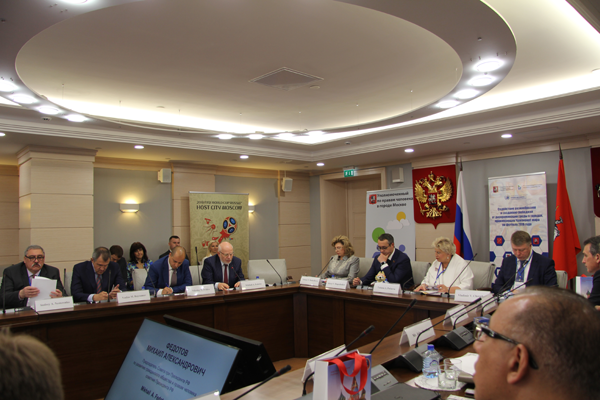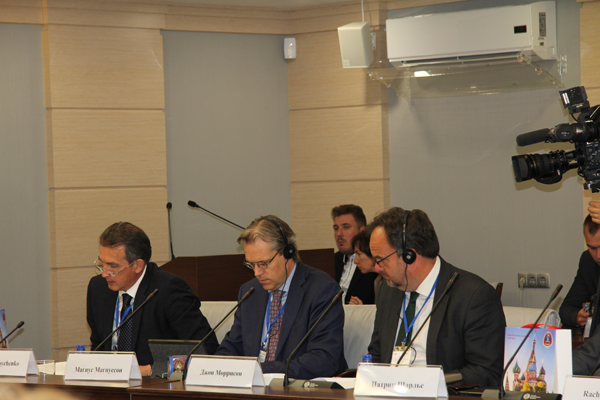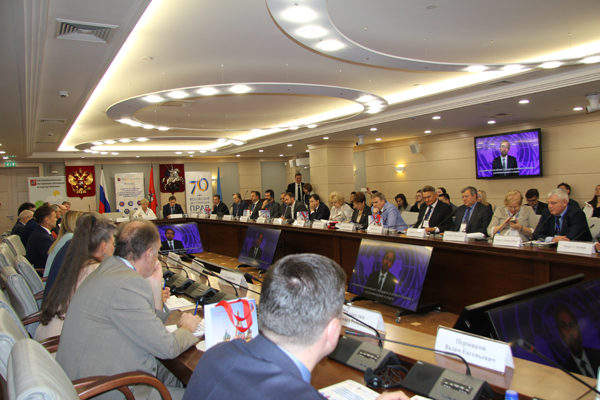FIFA World Cup 2018: High-level meeting on promoting diversity and a discrimination-free environment was held in Moscow
1 June 2018 (OHCHR) - On 31 May, right before the 2018 FIFA World Cup the UN Office of the High Commissioner for Human Rights together with the Government of Moscow and the Commissioner for Human Rights in the city of Moscow held a high-level meeting “Promoting diversity and a discrimination-free environment in cities hosting the FIFA World Cup 2018”. This meeting was among the activities implemented in the framework of cooperation between UN OHCHR and Russian and international stakeholders to include the human rights, notably non-discrimination policies, in the preparations for the FIFA World Cup 2018 and beyond.
Among the participants of the event there were international experts, including UN OHCHR and UNESCO, high-level representatives of federal state institutions, including Russian Ministry of Sport, Ministry of Foreign Affairs, Commissioner for Human Rights in Russia as well as Chairman of the Presidential Council for Civil Society and Human Rights; representatives of regional authorities and regional commissioners for human rights in cities hosting the FIFA World Cup 2018, representatives of civil society, including fans, and mass media.

“Sport does not exist in a vacuum, it is an activity involving human beings – with all of our faults – and takes place in a societal context… And sport is not just the players on the pitch, it is also the fans in the stadium, the fans at home, the communities around each venue, the workers who build the stadiums and produce the products sold, the volunteers who make such events possible and the journalists who report on them… Managed well, Mega-Sporting Events can set powerful social legacies, managed poorly sport can echo or even worsen discrimination in wider society”, - highlighted John Morrison, Chief Executive Officer of the Institute for Human Rights and Business and Mega-Sporting Events Platform for Human Rights (MSE Platform).
“Equal access is key to end discrimination: equal access for all to attend mega sports events, to receive proper physical education, to exercise freely any physical activity, to participate in international competitions, to reach well-deserved sport management and policymaking positions”, - said Magnus Magnusson, representative of UNESCO.

This high-level meeting offered an opportunity to define steps for the finalization and adoption of a “non-discrimination legacy” following the World Cup 2018, which the host cities can commit to and spread their experience throughout the country. At the end of the meeting, the participants adopted the resolution having decided that the World Cup host regions and cities and the regional human rights commissioners should play a leading role in the process of finalising the non-discrimination legacy with involvement of civil society and fan organisations. UN OHCHR and UNESCO expresses their willingness to assist in finalization and implementation of the legacy. “Adoption of a non-discrimination legacy for the World Cup will help Russian young people grow up in a diverse, free society that encourages them to fulfill their full potential”, - emphasized the UN Hugh Commissioner for Human Rights in his video message to the participants of the event.

Photo: OHCHR

